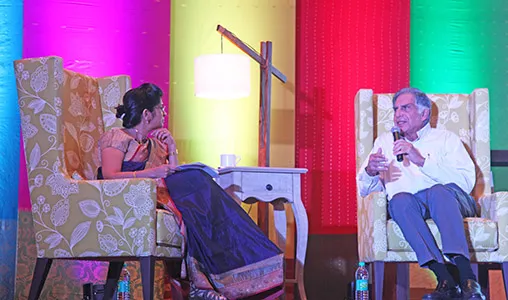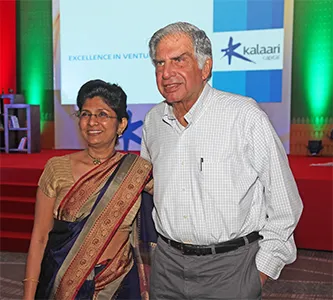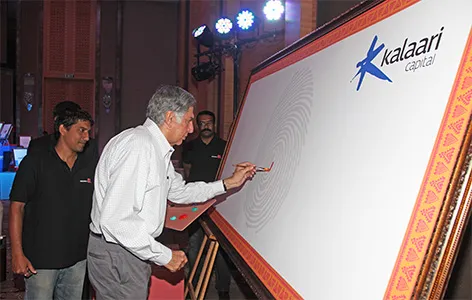I have a dream of an India where everyone has equal opportunity: Ratan Tata
If the last decade saw the IT revolution in India, this one is well on its way to witnessing the startup revolution. The Indian startup ecosystem has never been more vibrant and abuzz with opportunities and expectations. Today, not only has starting up become an integral part of our culture, but new age entrepreneurs have also excelled in the art of scaling up and establishing their businesses internationally.
The Mogul of Indian industries, Ratan Tata, embodies an inspiration to most of us. As one of the most respected Indian entrepreneurs, it is encouraging to see him actively supporting and engaging with upcoming startups and their founders. After taking his companies through the process of scaling up and succeeding multiple times, he has now turned to startups to inspire them, coach and mentor the founders to build large-scale businesses from India.
We had the opportunity to meet the gentleman at a Kalaari Capital event hosted yesterday in Bengaluru. A fireside chat with Ratan Tata conducted by Vani Kola, Managing Director, Kalaari Capital, was one of the highlights of the event. He has officially joined as an advisor to Kalaari team & their portfolio companies.
As he needs no introduction, Vani welcomed him on stage with a personal story. She shared, “I will begin with a confession. I grew up in a middle class household. I used to get Rs 30 as monthly allowance. I remember vividly, when I was 15 years old, I went to the nearby bookstore and picked up a biography of JRD Tata. The book documented the act of building a company, memoirs about his personal charisma, his magnetism and also his sacrifices to build an institution. My personal drive to become an entrepreneur, and later on a venture capitalist, came from these personal stories I read.”

Here are the excerpts from the Fireside Chat. We are sure we all can learn a lot from him:
Vani Kola: This question has been asked many a times and is important and intriguing in today’s environment too. Can leadership be acquired or is it an innate trait? How should entrepreneurs think about leadership?
Ratan Tata:. A sense of leadership occurs at very different times. It is usually unplanned. We all have aspirations hidden in ourselves; it is at unplanned moments that these emerge. Leadership is a lot about how you deal with crisis. How you act on what you think is right when the easier option to take is something else. It is an extremely subjective issue as well.
Rather than trying to define what constitutes leadership, it would be easier to say that you are a leader when you are committed to doing the right thing over the easy or best-for-you thing, and of doing this irrespective of how hard it is.
Do it not just for yourself, but for the community, for your customers, for your employees. I think these are the right components that make a leader.
Unfortunately, in some parts of world this is a minority view.
VK: You have stood up and have been a true leader on many occasions. We have seen you take some bold and unexpected decisions where you needed to take them. How can entrepreneurs do so, how have you done it?
RT: There is no formula for it but I will pick up an example. Leadership, also entrepreneurship, comes from and runs all the way down to your soul. When terrorists attacked the Taj Hotel, we had more than 300 guests staying at the hotel, people were eating at the restaurant, sitting in the lobby and working. Terrorists opened fire in a moment and started killing innocent people. In that moment, there was no manual that told the staff what to do. The staff turned off the lights, closed the doors, made people lie on the floor and helped as many as possible escape from danger or death. They lost their lives but saved many.
Harvard has written cases about what made the hotel staff do that and risk their own lives. It wasn’t taught, there was no planning, there wasn’t a simulated action to guide them but they turned out to be the real heroes, the real leaders of the evening. Leadership is something that can’t be replicated as is. It comes from within. When crisis takes place, a true leader knows what to do.
VK: But how do you cultivate this sense of leadership in people?
RT: If most employees have a pride in belonging to their enterprise, if they feel the environment they work in is fair and just, this sense of belonging drives leadership. And it is the job of the CEO to drive this. How you deal with employees, how you treat your customers, how well connected are you, matters a lot. No ESOP, shares, incentives can bring this sense of belonging that you - as a CEO and as a leader - can.

VK: Today, the success of young companies depends on being a market leader - from being the best in execution, to gaining the market share, to keeping their team together etc. In the process of doing all this, what should they be mindful of?
RT: Today, we see young, bright and capable entrepreneurs who risk not being a part of a big company and hope to set up something that they believe in and that will make a difference. Through hard work, ingenuity and faith, they are trying to be the best in the market.
Young entrepreneurs will make a difference in the Indian ecosystem. Days of seeking protection in the market, through legislation, through other means shouldn’t be seen as the way forward.Don’t take any shortcuts, whatsoever.
VK: There are times when everything feels euphoric and then there are times when nothing looks bright. Some young companies led by young entrepreneurs have not seen markets in bad shape and the challenges that come with it. You have seen a lot of both sides, is there a way to prepare for times of crisis?
RT: I am sure you have seen the scars of downturns. Venture capitalists take risks while putting in the capital in a young company and sometimes it doesn’t turn out as expected. When things go wrong, people will tell you things like ‘how could you be so stupid’ or ‘I always told you so.’ There isn’t one right way that you can follow, there isn’t a roadmap.
When things go wrong just deal with it openly, transparently and honestly.
Have your stakeholders’ trust. If you don’t try to cover up, most often your stakeholders will understand. They are also human beings like you, they understand your problems. They will protect you in hard times.
VK: For entrepreneurs, everything is personal and we would like to know how do you overcome personal adversity?
RT: Entrepreneurs have to have a sense of commitment to what they are trying to do. They take risks; their personal net worth, their time of life, everything is at stake to make their vision a reality.
When you have a vision and you are working to leave a mark on your community, do something for your customers, you can look forward to the satisfaction of seeing your business grow through all adversities. People who have a similar faith in the vision as the entrepreneur does, will be willing to share the risk with them.
VK : You have also created a great pipeline of talent, you have looked at nooks and corners of India to find great talent and to cultivate and nurture it. This talent has not only created an impact inside the TATA group but has gone ahead to create a much larger impact in India. What are your recipes for developing talent?
RT: Apart from the conventional forms of nurturing talent that are given, I would add just one point to identify talent in the current landscape.
I have made time for young entrepreneurs to drop by my office and meet me. My colleagues thought, and some still think, I am wasting my time, but I know these entrepreneurs are unique.
When you give a little time, help them with whatever you can, it is very gratifying to see this person become a successful entrepreneur in some years. You need to make time to mentor people, to help them genuinely with whatever you can.
One should not make entrepreneurs feel that they can’t do something in a particular area because the big corporations are there but should make them feel a part of the industry. Innovation is very important. In my early career, I went to work with many ideas everyday and I got the answer, ‘Shut up! You are very young, we have been doing it for 35 years.’ Startups have this advantage here, all the ideas are welcome as nobody has got any experience.

VK:When entrepreneurs go to their boards, we tell them to focus. And some of them come back to us saying they want to diversify. If Tata can do it, why not us? What’s your take - diversification or focus?RT: Diversification vs focus is a cultural issue. Conglomerates, with their diverse set of businesses, were the thing in the 60s in the US. And then in a decade or two they went back to their core businesses because of many factors. On the other hand, in India, Korea and Japan, conglomerates have succeeded with their set of diverse businesses. There is nothing wrong in diversification if you can manage well. There is nothing wrong in running a focused business either if you wish to. It is your commitment to it that matters.
Audience Q and A
Shripal Gandhi, Swipe Telecom
Q: What has been driving you all these years? Who is your role model when it comes to dealing with difficult situations?
RT: I would like to repeat here that there is no single or right way to deal with situations. As head of an urban enterprise, it is completely up to you how long you’d like to stay with it in times of difficulties. Should you let go, cut your losses, learn your lessons and move one, I don’t know. You can be attached to it emotionally, driven by a feeling that it had to be the one and you had to make it successful but sometimes you will still need to move on. Or you stay through the situation and see how the tides turn, you can stick with it and make it work may be. It is one thing that every leader faces.
It is also the most difficult thing for any leader to decide - whether to let go or to stick.
Harsh Jain, Dream11
Q: Can you think of some quintessential qualities of entrepreneurs from other countries or cultures that you think we, Indian entrepreneurs, can imbibe to be better?
RT: There is nothing as Indian entrepreneurs that we have or that we do which is less effective. But we are still a country with a desire for protection around us. We face competition in the market, we face obstacles from certain enterprises, and some bigger enterprises want to keep themselves protected from competition. If and when you are in such a situation, don’t turn to protection. Fight aggressively, honestly and with transparency in the market.
Win or lose based on your capability, not on the basis of any subjective means or your power in a certain circle.
It is important to recognize that in other countries Indian entrepreneurs don’t face obstacles doing business just because they are from India. The environment of doing business is exceedingly important, everyone should have a fair chance to succeed.
Mukesh Bansal, Myntra
Q: What kind of culture does the Tata group have? Could you share its genesis and also how you protected, nurtured and spread it across all the businesses under the Tata umbrella?
RT: Culture is always introduced at the top. The tone of the company and the culture is given by the CEO and it travels down to all. It is the responsibility of a leader to have a culture he is proud of. How many enterprises today can hold a hand to their heart and say we are proud of the culture we have built. Culture is not about how you are making profits, but how you do business day to day. We can vouch for transparency. If an enterprise sees a leader close his eyes and take a shortcut that is not a culture one should be proud of. Culture is self imposed. Let the environment test you all the time but you should be prepared to do the right thing. That is a culture one should be proud of.
Q: What can be done so that entrepreneurship becomes more mainstream in India?
RT: The growth and development of enterprise and entrepreneur is directly related to the probability of profitability and the attractiveness of the enterprise in a free market situation.
Entrepreneurs create enterprises because they are attracted to create something that they believe in. In India, we need to create an environment that enables and supports people to risk their time, spend an important and sizeable amount of their lives to build the business they believe in. There is definitely a financing ability needed to provide funds to promising companies. There should be no fear of failure. Failure should mean lessons learnt and not demolishment of an entrepreneur’s reputation. We need a free environment for businesses to grow. Many leaders in large corporations want to work at a small enterprise.
The happiest time for a leader is not when you are alone at the top. But when you are around people whom you know by first names and can share your ideas with.
I am personally very excited to mentor startups. When I risk my capital, spend some of my time and the person succeeds, I also feel the satisfaction that comes from the small role I play in it. This opportunity was not available to me earlier because of the enterprises I was involved in running, I didn’t have the time, but now I have the time.
It is the responsibility of leaders in large corporations to mentor new entrepreneurs. Corporations shouldn’t see talking to entrepreneurs as a waste of time. You never know these young dynamic entrepreneurs might be eating their breakfasts few years down the line. And these new entrepreneurs that we are talking about should also talk to aspiring entrepreneurs to give advice on how they started, what should be done, what worked, about their mistakes.

Sunil Palrecha, Germin8
Q: India has been strong on services; what would be your guidance for IT product companies from India that want to go global?
RT: I would like to change the context from going global to going international because going global for us has mostly meant being all across the world market and I think your question is more about entering an international market.
When you look at going international, you must believe you can address that international market efficiently. You should think to go international because you have done it in your home market, you have got the market here, you have the experience and the learnings of this market and you want to capture newer grounds now. If you want to go international just for the sake of it, just by growing by acquisitions and it is not driven by strategy, it is the wrong thing to do.
Girish Ramdas, Magzter
Q: How is your digital life? Are you digitally wired? What kind of gadgets/technology do you use?
RT: If we were here 10 years ago, I would happily say that I am digitally wired. But with the advances in the digital products and apps, I find myself unable to keep up. I use a smartphone, I have an iPad but I still struggle to type with two fingers on the touch screen.
I crave for some technology where there is a good voice to text conversion. I wish I could read from a screen like I am holding a paper in hand. I use a cell phone, but only five per cent of its capability.
Even if I decide to know it better, by the time I know it better there is a new product in the market. Digital life attracts me immensely but I am not really digitally wired.
Vani Kola, Kalaari Capital
Q: What do you dream of about the future of India?
RT: I have a dream of India where everyone has equal opportunity.
What hurts me is that it is still important who your father is, what is your surname and how much power you have. If the person next to you is equally capable but doesn’t have the father, the surname, the power, it should not matter.
India needs to transform itself in a way when any Indian who has the ability and who is making an effort to succeed, environment should support that success trajectory and not be envious of that.







